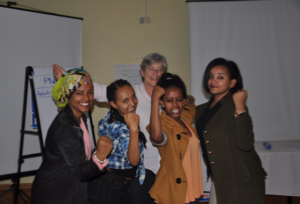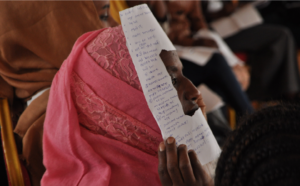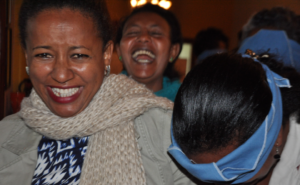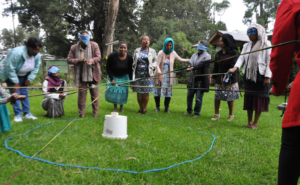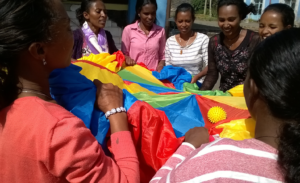INTRODUCING STEP
The Sustainable Training and Education Programme (STEP) is committed to improve the quality of education in vocational colleges and universities of Ethiopia for women and men. We work together to better the quality of teaching, establish effective systems in educational institutions and develop the skills of managers, who lead in the educational sector. We help to establish sustainable quality of education that prepares people for the jobs that will contribute to growth in Ethiopia’s economy.
Promoting gender equality is an integrative part of STEP and particularly of its Technical Vocational Training and Education (TVET) component. Addis Ababa City Government TVET Bureau, the regulating and supervising body for regional TVET endeavours, has welcomed a development advisor in June 2015, who is focusing with a national colleague on burning gender issues in the vocational sector.
ETHIOPIA’S GENDER CONTEXT
Ethiopia has a Gender Inequality Index value of 0.499, ranking it 116 out of 159 countries in the UNDP 2015 index. Gender Based Violence (GBV) isprevalent in Ethiopia. Despite the development of legislation and campaigns, violence against women and girls continues to be a major challenge and a threat to women’s empowerment. Women and girls face physical, psychological and sexual abuses, that undermine their health and ability to earn livelihoods, disrupt their social systems and relationships and deprive them of their childhood and education. Although Ethiopia has made significant progress in narrowing the gender gap in primary education, the same is not true at secondary and tertiary levels.
Furthermore, the quality of education has decreased at all grade levels, while the focus was placed in increasing access.
Low numbers of women hold teaching and educational leadership positions. National data shows that there are more male teachers than female teachers at every level except kindergarten. The ratio is even more unequal in higher education and within leadership /administrative positions in schools, universities and government at all levels. Specific data mirrors the same gender relations in urban Addis Ababa TVET in so far as the number of male teachers is three times the number of female teachers and only one polytechnic college has a female leader – the only one in Ethiopia.
APPROACHES PROVEN EFFECTIVE
To address the issues prevalent in the mentioned gender context of Ethiopia, we have actively worked on the following adjacent projects: capacity building, childcare services, internships for young female professionals and female driven networking activities.
- CAPACITY BUILDING
Since women are kept far behind in all aspects of realizing their educational and professional potentials, we decided first to focus mainly on capacitating women in TVET – gender focal persons, trainers, leaders – and to accompany them intensively in their professional tasks as well as to coach them in creating and implementing innovative gender relevant activities and projects in their field of responsibility. What we expect and monitor as results and impact are empowered women, increased productivity in their work environment, and more understanding on how to communicate with teams and students, especially with female students.
A participatory teaching and learning approach is the common basis, which all trainings share and which turn them into a real life experience for participants and a key success factor for facilitators. Principals of adult learning are always respected: discovering the strengths of the participants, nurturing inquiry and dialogue in action, and honouring the difference in learning styles. Creative assessment tools are in use to help participants to examine their identity, leadership skills and (personal) challenges. They are encouraged to set developmental goals, and experiential and team based activities are employed to leverage their own experiences in co-creating solutions to enhance leadership skills and support through a peer learning and mentoring model. This enables participants to share their challenges, utilize innovation techniques and chart a course for greater effectiveness. Examples of trainings offered are:
Monthly Training for Gender Focal Persons
“I learned from this training to develop my confidence and positive self image: Nothing is impossible, everything is possible.” – Briktawit Shimelis
Monthly trainings and experience sharing for gender focal persons of Addis Ababa’s TVET colleges deepened and upgraded their gender mainstreaming knowledge, skills and commitment and encouraged them to implement relevant female friendly projects in their colleges. More than 50% reported newly arranged projects – e.g. awareness raising activities, brochures, mini radio, gender clubs and toilet construction for female students.
Coaching for Female Trainers
“In this training what I remind and build in to me is self-confidence, avoiding of fear and being wise and high status human.” – Yirgaelem Mehari
The coaching for female trainers focused on strengthening self-confidence and social competency in a male dominated TVET workplace in order to feel encouraged and in a better position to be a role model for female students. 11 out of 19 (58%) regular participants documented increased self-confidence, self-knowledge and social competency. Three of them, who acquired and used their new skills confidently, got promoted to a deputy dean position in their college. Three others succeeded to become promising candidates for leadership positions.
Creative Leadership Training
“After this training, my skills, knowledge and attitude are going to change for the better!” – Mulu Atsbha
Female leaders took part in creative leadership training boosting their leadership tools and quality as well as their networking skills within six days. After the training some of them stepped into peer exchange for better leadership and got professional coaching from time to time. 13 out of 25 participants (52%) confirmed their higher leadership quality.
Psychosocial Counselling Training
“The trainer’s manner is open and thoughtful. She is comfortable. We loved the way she explained and involved us. It opened our eyes to a new way of doing things. The various practices like exploring self-esteem, group counselling, communication styles and individual counselling was really nice to experience.” – Azeb Gedamu
A mix of female TVET gender focal persons, trainers, and leaders enjoyed a 10 day training called psychosocial counselling training which provided space for getting aware of oneself and learning about different counselling and coping mechanisms. The training was shaped as to reconcile personal (often violent) life experiences and to encourage a future self that is reflective, free of inner hindrances and positively determined and supportive to oneself and to female students.
- CHILDCARE: PARENTING AND PROFESSION
On average a woman raises 4.3 children in urban Ethiopia. Since it is a common experience of all women – students, trainers, leaders – that combining parenting and profession is a serious challenge, a pilot project aiming to offer day care service has been established. Our early initiative was most welcomed in TVET and not only the planned one, but even three Polytechnic TVET Colleges shared the vision and joined forces under the lead of recently appointed female deans and vice deans. Strengthened by the acquired leadership skills from our trainings, the female leaders aligned, directed and committed themselves and their teams and cooperated highly motivated with us for gender equality and women empowerment.
Benefits and Success
Since April 2017 three colleges – Entoto, Tegbare -id and General Wingate Polytechnic College – are providing professional day care for young children of their female employees and female students. Each day care can serve 15 to 20 kids from the age of three months to four years during daily teaching and learning hours.
Day care services are alleviating the burden of young mothers and allow them to follow up their profession or their education. More young mothers will get encouraged to enter TVET and will be able to sustain in their courses. Knowing their kids are in a supportive social environment is strengthening women to follow their dreams and visions for their own professional career and economic growth. In addition TVET colleges gain a lot since female teachers are attracted and remain steadily in the college team.
A mother teaching at one college used to be very worried about leaving her 10 months old son at home with a nanny. “But now I feel relief leaving him in a clean and safe environment where I get to feed him when I am on break.” Furthermore, research shows that children who received quality care and education in their early years have significantly higher educational attainment, a much higher earnings level and well-developed social and cognitive skills. Playing with peers improves children’s social, emotional, behavioural, and cognitive and language development.
Public Recognition
After launching the first day care centres with high media coverage and the presence of the Federal Minister of Women and Children Affairs and the German Ambassador, day care services are considered as a very basic measure and requirement for promoting gender equality and women empowerment. That is why all larger TVET colleges in Addis Ababa, 14 in number, meanwhile engage in launching early childcare in their premises.
- INTERNSHIPS FOR YOUNG FEMALE PROFESSIONALS AND NETWORKING
“The internship was extremely valuable to me. It was a small taste of the real world. I reflect back on all what I have learned. I gathered my knowledge in the field of women and children. It was an excellent experience for me.” – Sawda Kedir
In order to consult and support this dynamic and powerful gender equality initiative effectively, we revitalized and made wide use of the GIZ country’s office gender programme for young female graduates. By creating meaningful six months internships for four young women, we could develop a well thought through day care concept for Addis Ababa TVET, recruit and accompany care givers at work and especially create professional networks in order to develop an early child care education in Ethiopia as a new occupation and promising job opportunity.
Furthermore, creating encounters between women from diverse backgrounds and with diverse dreams is another passion of ours: to come together and explore each other’s paths – challenges, triumphs, perseverance, learning and ultimately the growth each one experiences in the multitude of encounters that surround one’s personal and professional lives. To serve this goal we are actively participating in the monthly events and yearly forums held by the Association of Women in Boldness’ (AWiB). We believe in connecting women engaged in TVET with others of the private sector and networking among all for progressive synergies.

 GIZ Gender Website
GIZ Gender Website